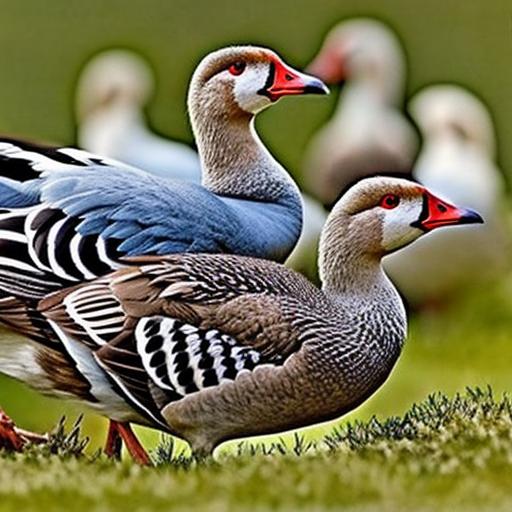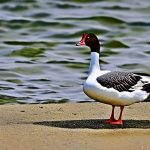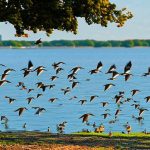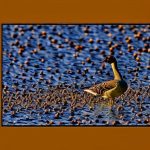Geese are beautiful creatures that can add a touch of nature to any yard. However, they can also become a nuisance if they start to invade your space. Understanding the behavior of geese is important in order to effectively deter them from your yard. Geese can cause damage to lawns, gardens, and property, and their droppings can be unsightly and unsanitary. By understanding their behavior and implementing humane methods of control, you can create a harmonious coexistence with these birds.
Key Takeaways
- Geese are social animals that prefer to live in groups and are highly territorial.
- Geese are attracted to yards with open spaces, water sources, and food availability.
- Physical barriers such as fences, netting, and hedges can prevent geese from entering your yard.
- Decoys, scare tactics, and predator sounds can be effective in deterring geese from your property.
- Removing food sources such as bird feeders and cleaning up fallen fruits can discourage geese from visiting your yard.
Understanding the behavior of geese
Geese are highly social animals that live in flocks. They have a strong sense of community and rely on each other for protection and navigation. Understanding their social behavior can help you predict their movements and take appropriate action to deter them from your yard. Geese communicate with each other through vocalizations and body language. They use honking sounds to alert each other of potential dangers or to communicate their location. By understanding their communication methods, you can use it to your advantage in deterring them from your yard.
Identifying the reasons why geese are attracted to your yard
There are several reasons why geese are attracted to residential areas. One common reason is the availability of food sources. Geese are herbivores and feed on grass, grains, and aquatic plants. If your yard has an abundance of these food sources, it may attract geese. Another reason is the presence of water sources such as ponds or lakes. Geese are waterfowl and require access to water for drinking, bathing, and nesting. If your yard has a water source, it may be attractive to geese for these reasons.
Understanding why geese are attracted to your yard can help you take preventative measures to deter them. For example, if you have a pond in your yard, you can install a fence or netting around it to prevent geese from accessing it. If you have a lot of grass or grains in your yard, you can consider reducing the amount of these food sources to make your yard less attractive to geese.
Implementing physical barriers to keep geese out
Physical barriers can be an effective way to keep geese out of your yard. There are several types of physical barriers that can be used, such as fences, netting, and hedges. Fences can be made of materials such as wire or plastic and should be at least three feet high to prevent geese from jumping over them. Netting can be used to cover ponds or other water sources to prevent geese from accessing them. Hedges can also be used as a natural barrier to deter geese.
When installing physical barriers, it is important to ensure that they are properly installed and maintained. Fences should be securely anchored to the ground to prevent geese from digging underneath them. Netting should be tightly secured and regularly checked for any tears or holes. Hedges should be trimmed regularly to maintain their effectiveness as a barrier.
Using decoys and scare tactics to deter geese
Decoys and scare tactics can be effective in deterring geese from your yard. Decoys are objects that resemble geese and can be placed in your yard to make it appear occupied by other birds. There are several types of decoys available, including plastic or wooden decoys that can be placed on the ground or in the water. Scare tactics involve using noise or movement to frighten geese away. This can include using devices such as motion-activated sprinklers, noise-making devices, or even trained dogs.
When using decoys and scare tactics, it is important to use them effectively without causing harm to the geese. Decoys should be moved regularly to prevent geese from becoming accustomed to their presence. Scare tactics should be used sparingly to avoid causing unnecessary stress to the geese. It is also important to ensure that any noise-making devices are within legal limits and do not violate any noise ordinances in your area.
Removing food sources that attract geese
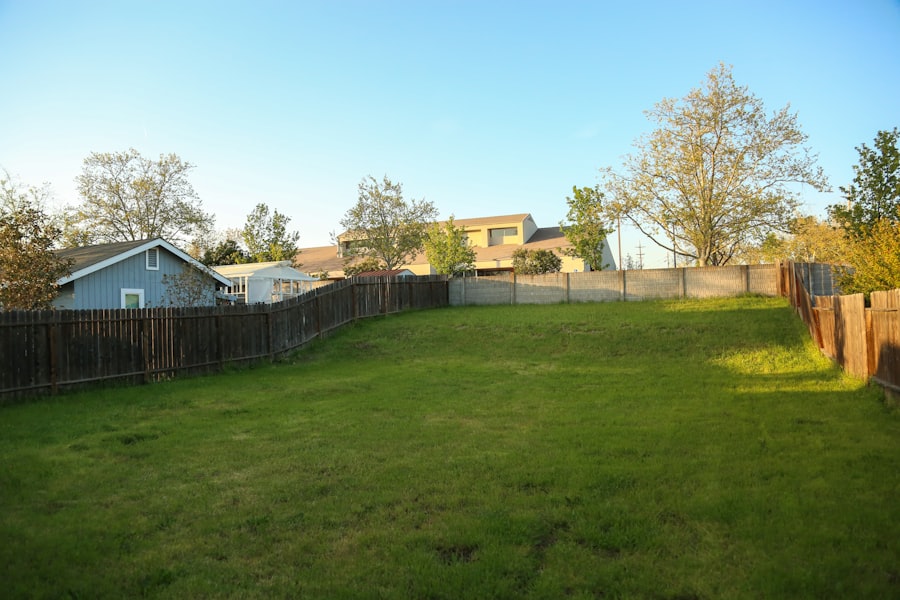
As mentioned earlier, food sources are a common reason why geese are attracted to residential areas. Removing these food sources can help deter geese from your yard. This can include reducing the amount of grass or grains in your yard, as well as removing any fallen fruits or vegetables. It is also important to properly dispose of garbage and keep trash cans securely covered to prevent geese from accessing them.
Planting vegetation that geese dislike
There are certain types of vegetation that geese dislike and are less likely to feed on. Planting these types of vegetation in your yard can help deter geese. Some examples of vegetation that geese dislike include tall grasses, prickly shrubs, and plants with strong odors. These types of vegetation can create a physical barrier and make it less appealing for geese to land and feed in your yard.
When planting vegetation, it is important to properly maintain it to ensure its effectiveness in deterring geese. Tall grasses should be regularly trimmed to prevent them from becoming overgrown and losing their deterrent effect. Prickly shrubs should be pruned regularly to maintain their density and prevent geese from landing on them.
Creating alternative habitats for geese
Creating alternative habitats for geese can help redirect their presence away from your yard. This can include creating a designated area with water and food sources specifically for geese. By providing an alternative habitat, you can encourage geese to congregate in a specific area rather than in your yard. This can be done by creating a small pond or wetland area with suitable vegetation and food sources.
When creating alternative habitats, it is important to do so in a humane way. The habitat should be designed to meet the specific needs of geese, including access to water, food, and suitable nesting sites. It is also important to regularly monitor and maintain the habitat to ensure its effectiveness and prevent it from becoming overcrowded or unsanitary.
Utilizing sound and light to repel geese
Sound and light devices can be used to repel geese from your yard. There are several types of devices available, including ultrasonic devices that emit high-frequency sounds that are unpleasant to geese, as well as devices that emit flashing lights or lasers. These devices can be placed strategically in your yard to create a deterrent effect.
When using sound and light devices, it is important to use them effectively without causing harm to the geese. The devices should be placed in areas where geese are likely to congregate, such as near water sources or feeding areas. It is also important to regularly check and maintain the devices to ensure their effectiveness.
Seeking professional help for persistent geese problems
In some cases, professional help may be necessary to address persistent geese problems. This can include situations where geese have become aggressive or are causing significant damage to property. A professional who specializes in humane geese control can assess the situation and provide appropriate recommendations for deterrence.
When seeking professional help, it is important to find a reputable company or individual who has experience in humane geese control. They should be knowledgeable about the behavior of geese and able to provide effective solutions that do not cause harm to the birds. It is also important to ensure that any methods used comply with local regulations and ordinances regarding wildlife control.
Adopting a humane approach to geese control
It is important to adopt a humane approach when dealing with geese control. Geese are living creatures that deserve respect and compassion. By using humane methods, you can effectively deter geese from your yard without causing harm to them. This includes using deterrents that do not cause unnecessary stress or harm, as well as providing alternative habitats and food sources for geese.
In conclusion, understanding the behavior of geese and implementing humane methods of control can help create a harmonious coexistence with these birds. By identifying the reasons why geese are attracted to your yard and taking appropriate action, you can effectively deter them without causing harm. Whether it’s through physical barriers, decoys and scare tactics, removing food sources, planting vegetation, creating alternative habitats, or utilizing sound and light devices, there are many humane methods available to control geese in your yard. By treating geese with respect and compassion, you can create a peaceful environment for both humans and wildlife.
If you’re looking for ways to keep geese out of your yard, you might also be interested in learning about large chicken coop ideas. A well-designed and secure chicken coop can not only provide a safe and comfortable home for your chickens but also help keep unwanted visitors, like geese, at bay. Check out this article on poultrywizard.com for some creative and effective ideas to protect your yard from geese while providing a great living space for your feathered friends.
FAQs
What are some common reasons why geese enter yards?
Geese may enter yards in search of food, water, or nesting sites. They may also be attracted to the grass and vegetation in the yard.
What are some effective ways to keep geese out of yards?
Some effective ways to keep geese out of yards include installing physical barriers such as fences or netting, using decoys or scare tactics, and removing any sources of food or water that may be attracting the geese.
Are there any humane methods for keeping geese out of yards?
Yes, there are several humane methods for keeping geese out of yards. These include using decoys or scare tactics, such as motion-activated sprinklers or noise-making devices, and removing any sources of food or water that may be attracting the geese.
What are some potential risks associated with geese in yards?
Geese can be aggressive and may attack humans or pets if they feel threatened. They can also cause damage to property and landscaping, and their droppings can create unsanitary conditions.
Is it legal to harm or kill geese that enter yards?
In most cases, it is illegal to harm or kill geese that enter yards. Geese are protected under federal and state laws, and there are strict regulations governing their management and control. It is important to consult with local authorities or wildlife experts before taking any action to remove geese from your yard.
Meet Walter, the feathered-friend fanatic of Florida! Nestled in the sunshine state, Walter struts through life with his feathered companions, clucking his way to happiness. With a coop that’s fancier than a five-star hotel, he’s the Don Juan of the chicken world. When he’s not teaching his hens to do the cha-cha, you’ll find him in a heated debate with his prized rooster, Sir Clucks-a-Lot. Walter’s poultry passion is no yolk; he’s the sunny-side-up guy you never knew you needed in your flock of friends!

